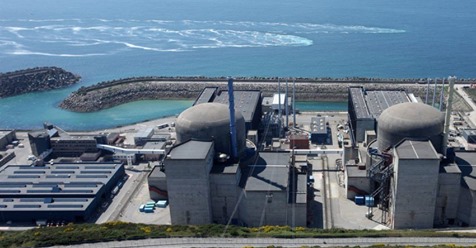Dangers posed by nuclear power
The island of Jersey newspaper Bailiwick Express recently reported on concerns about the French nuclear plant at Flamanville in north-western France. Jersey is one of the Channel Islands, an archipelago in the English Channel, off the French coast of Normandy. The newspaper article pointed out that:
"A nuclear plant around 30 miles from Jersey's coast has been put under surveillance after a number of faults were discovered at the facility.
The French Authority for Nuclear Safety (l’Autorité de Sûreté Nucléaire) announced last week that both reactors at Flammanville, which is run by state-owned electric utility company EDF, had been placed on watch due to ongoing maintenance and oversight problems."
The danger posed by nuclear power though is not just another potential disastrous Chernobyl type accident, and as concerns about the Flamanville plant make clear this is a real possibility. There is also the whole issue of nuclear waste, as the environmental organisation Greenpeace points out: "this waste is produced at every stage of the nuclear fuel cycle, from uranium mining and enrichment, to reactor operation and the reprocessing of spent nuclear fuel. Much of this nuclear waste will remain hazardous for hundreds of thousands of years."
Since the time that humans have been producing nuclear waste, there has been a failure in solving the problem of how to dispose of it. It is estimated that over a quarter of a million tons of hazardous nuclear waste exists that requires "final" storage. That figure is added to annually by some 12,000 tons. This will increase as further planned nuclear power plants are built. Greenpeace make the point that: "the current “solution” for dealing with highly radioactive nuclear waste involves burying it in deep underground sites. Whether the storage containers, the store itself, or the surrounding rocks will offer enough protection to stop radioactivity from escaping in the long-term is impossible to predict."
In reporting on the concerns about Flamanville, the Celtic League has also drawn attention to a recent article on the Bloomberg news site about problems with EDF run nuclear plants in France. Électricité de France S.A. (EDF; Electricity of France) is a French electric utility company, largely owned by the French state. Bloomberg reports: "EDF has identified 16 steam generators at six operating reactor units that don’t meet manufacturing standards, it said." The Celtic League point out that they have a long standing policy of opposition to new build nuclear plants and have questioned the safety case for service life extension of older plants. Many of which are located within Celtic nations or close to them. As the Chernobyl disaster also made clear, nuclear accidents don't need to be on your doorstep to cause problems. Although the worst hit regions were Belarus, Ukraine, and Russia, with approximately 100,000 square kilometres (39,000 sq mi) of land being significantly contaminated with fallout, levels of contamination were also detected over all of Europe after the Chernobyl accident. The Celtic League article is printed below:
"NUCLEAR PLANT WOES
News that EDF the operator of most UK nuclear plants, including Heysham in Lancashire and Hunterston B in Scotland is having problems with its new Flamanville site in France:
https://www.bailiwickexpress.com/…/flamanville-plant-unde…/…
https://www.bloomberg.com/…/edf-says-six-nuclear-reactors-a…
EDF are currently constructing the new UK nuclear power plant at Hinkley Point although other plans by rival operators for plants at Wylfa in Wales and at Sellafield appears to be on hold at present.
The Celtic League opposes new build nuclear plants and adopted a resolution to this effect at its AGM in Brittany in 2006. The League also has questioned the safety case for service life extension of older plants such as Heysham and Hunterston.
Bernard Moffatt
AGS Celtic League"







